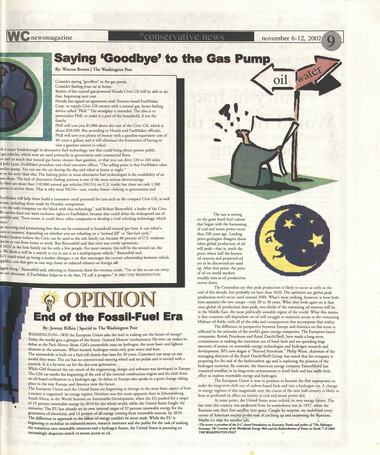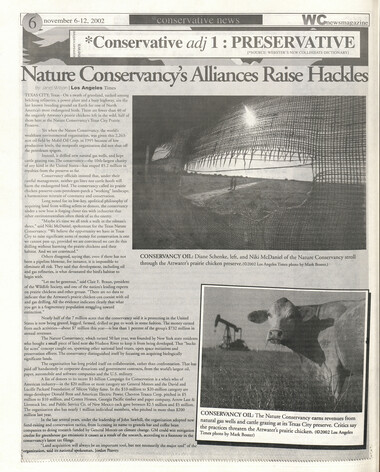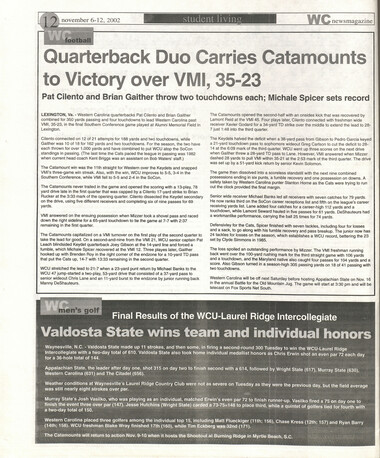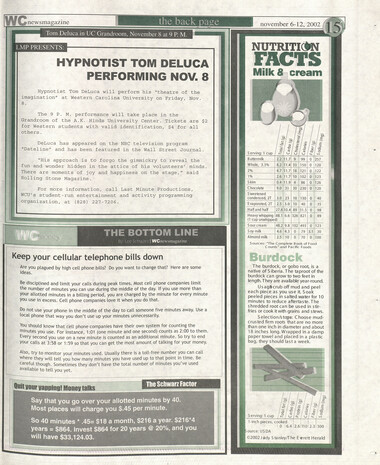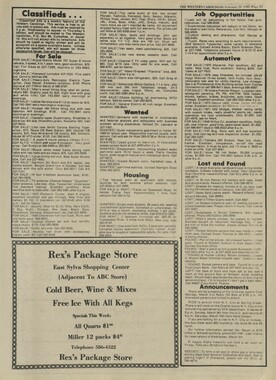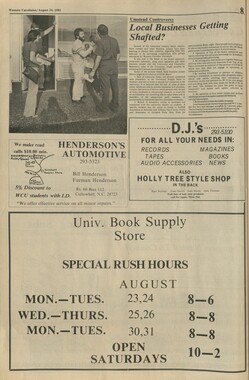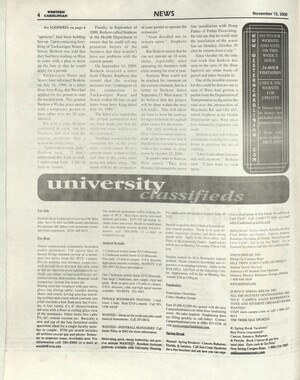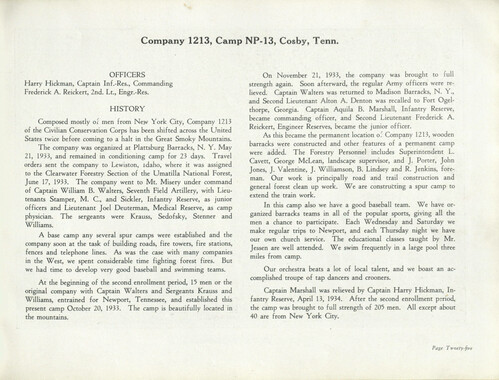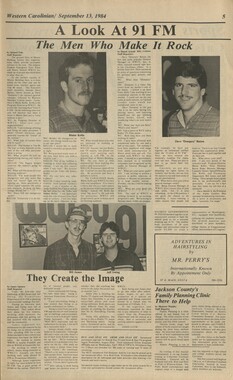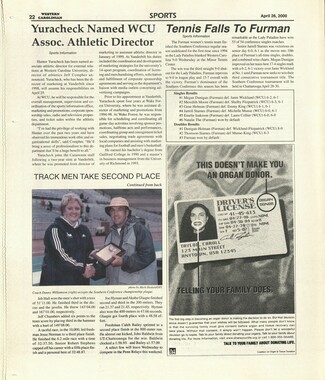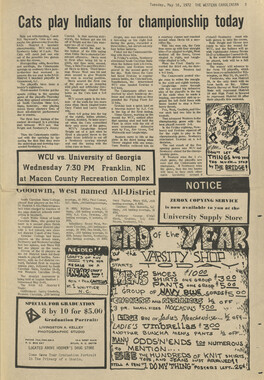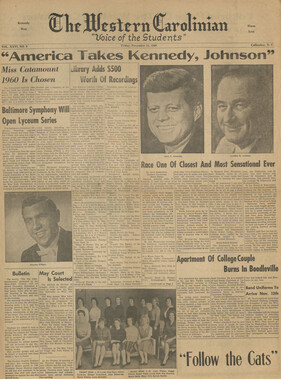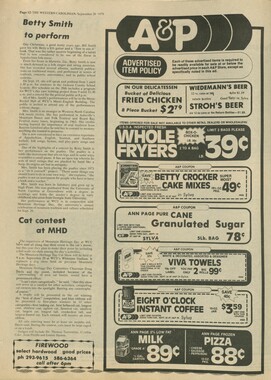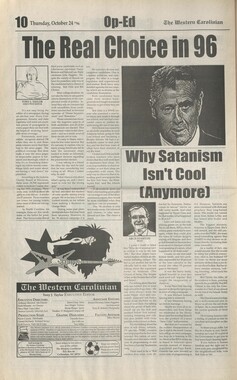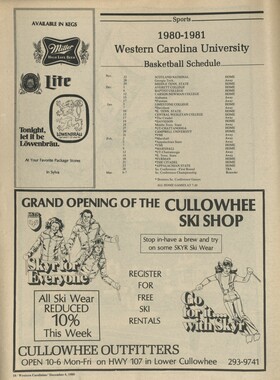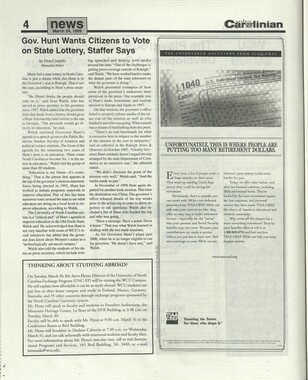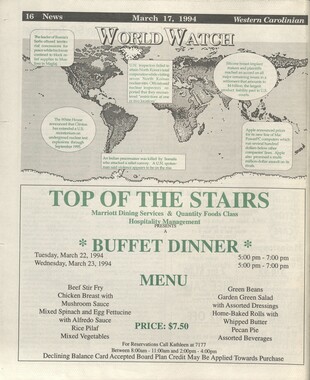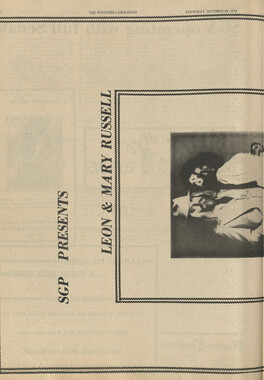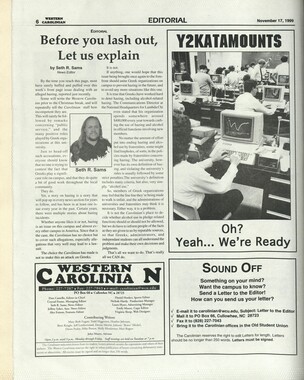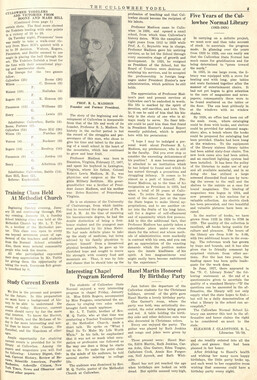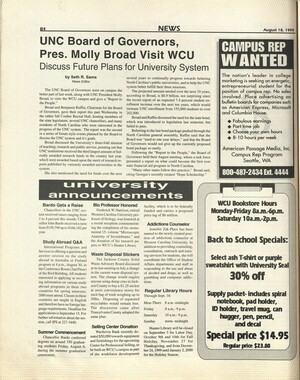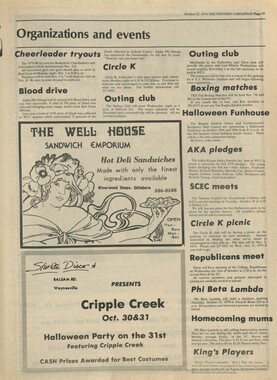Western Carolina University (20)
View all
- Canton Champion Fibre Company (2308)
- Cherokee Traditions (292)
- Civil War in Southern Appalachia (165)
- Craft Revival (1942)
- Great Smoky Mountains - A Park for America (2766)
- Highlights from Western Carolina University (430)
- Horace Kephart (941)
- Journeys Through Jackson (154)
- LGBTQIA+ Archive of Jackson County (85)
- Oral Histories of Western North Carolina (314)
- Picturing Appalachia (6772)
- Stories of Mountain Folk (413)
- Travel Western North Carolina (160)
- Western Carolina University Fine Art Museum Vitreograph Collection (129)
- Western Carolina University Herbarium (92)
- Western Carolina University: Making Memories (708)
- Western Carolina University Publications (2283)
- Western Carolina University Restricted Electronic Theses and Dissertations (146)
- Western North Carolina Regional Maps (71)
- World War II in Southern Appalachia (131)
University of North Carolina Asheville (6)
View all
- Allanstand Cottage Industries (62)
- Appalachian National Park Association (53)
- Bennett, Kelly, 1890-1974 (1388)
- Berry, Walter (76)
- Brasstown Carvers (40)
- Carver, George Washington, 1864?-1943 (26)
- Cathey, Joseph, 1803-1874 (1)
- Champion Fibre Company (233)
- Champion Paper and Fibre Company (297)
- Cherokee Indian Fair Association (16)
- Cherokee Language Program (22)
- Crowe, Amanda (40)
- Edmonston, Thomas Benton, 1842-1907 (7)
- Ensley, A. L. (Abraham Lincoln), 1865-1948 (275)
- Fromer, Irving Rhodes, 1913-1994 (70)
- George Butz (BFS 1907) (46)
- Goodrich, Frances Louisa (120)
- Grant, George Alexander, 1891-1964 (96)
- Heard, Marian Gladys (60)
- Kephart, Calvin, 1883-1969 (15)
- Kephart, Horace, 1862-1931 (313)
- Kephart, Laura, 1862-1954 (39)
- Laney, Gideon Thomas, 1889-1976 (439)
- Masa, George, 1881-1933 (61)
- McElhinney, William Julian, 1896-1953 (44)
- Niggli, Josephina, 1910-1983 (10)
- North Carolina Park Commission (105)
- Osborne, Kezia Stradley (9)
- Owens, Samuel Robert, 1918-1995 (11)
- Penland Weavers and Potters (36)
- Roberts, Vivienne (15)
- Roth, Albert, 1890-1974 (142)
- Schenck, Carl Alwin, 1868-1955 (1)
- Sherrill's Photography Studio (2565)
- Southern Highland Handicraft Guild (127)
- Southern Highlanders, Inc. (71)
- Stalcup, Jesse Bryson (46)
- Stearns, I. K. (213)
- Thompson, James Edward, 1880-1976 (226)
- United States. Indian Arts and Crafts Board (130)
- USFS (683)
- Vance, Zebulon Baird, 1830-1894 (1)
- Weaver, Zebulon, 1872-1948 (58)
- Western Carolina College (230)
- Western Carolina Teachers College (282)
- Western Carolina University (1794)
- Western Carolina University. Mountain Heritage Center (18)
- Whitman, Walt, 1819-1892 (10)
- Wilburn, Hiram Coleman, 1880-1967 (73)
- Williams, Isadora (3)
- Cain, Doreyl Ammons (0)
- Crittenden, Lorraine (0)
- Rhodes, Judy (0)
- Smith, Edward Clark (0)
- Appalachian Region, Southern (2569)
- Asheville (N.C.) (1923)
- Avery County (N.C.) (26)
- Blount County (Tenn.) (161)
- Buncombe County (N.C.) (1672)
- Cherokee County (N.C.) (283)
- Clay County (N.C.) (555)
- Graham County (N.C.) (233)
- Great Smoky Mountains National Park (N.C. and Tenn.) (519)
- Haywood County (N.C.) (3524)
- Henderson County (N.C.) (70)
- Jackson County (N.C.) (4694)
- Knox County (Tenn.) (25)
- Knoxville (Tenn.) (12)
- Lake Santeetlah (N.C.) (10)
- Macon County (N.C.) (420)
- Madison County (N.C.) (212)
- McDowell County (N.C.) (39)
- Mitchell County (N.C.) (132)
- Polk County (N.C.) (35)
- Qualla Boundary (981)
- Rutherford County (N.C.) (76)
- Swain County (N.C.) (2115)
- Transylvania County (N.C.) (270)
- Watauga County (N.C.) (12)
- Waynesville (N.C.) (84)
- Yancey County (N.C.) (72)
- Aerial Photographs (3)
- Aerial Views (60)
- Albums (books) (4)
- Articles (1)
- Artifacts (object Genre) (228)
- Bibliographies (1)
- Biography (general Genre) (2)
- Cards (information Artifacts) (38)
- Clippings (information Artifacts) (191)
- Crafts (art Genres) (622)
- Depictions (visual Works) (21)
- Design Drawings (1)
- Drawings (visual Works) (184)
- Envelopes (73)
- Facsimiles (reproductions) (1)
- Fiction (general Genre) (4)
- Financial Records (12)
- Fliers (printed Matter) (67)
- Glass Plate Negatives (381)
- Guidebooks (2)
- Internegatives (10)
- Interviews (815)
- Land Surveys (102)
- Letters (correspondence) (1013)
- Manuscripts (documents) (618)
- Maps (documents) (177)
- Memorandums (25)
- Minutes (administrative Records) (59)
- Negatives (photographs) (5835)
- Newsletters (1285)
- Newspapers (2)
- Occupation Currency (1)
- Paintings (visual Works) (1)
- Pen And Ink Drawings (1)
- Periodicals (193)
- Personal Narratives (10)
- Photographs (12976)
- Plans (maps) (1)
- Poetry (6)
- Portraits (4533)
- Postcards (329)
- Programs (documents) (151)
- Publications (documents) (2236)
- Questionnaires (65)
- Scrapbooks (282)
- Sheet Music (2)
- Slides (photographs) (402)
- Songs (musical Compositions) (2)
- Sound Recordings (796)
- Specimens (92)
- Speeches (documents) (15)
- Tintypes (photographs) (8)
- Transcripts (322)
- Video Recordings (physical Artifacts) (23)
- Vitreographs (129)
- Text Messages (0)
- A.L. Ensley Collection (275)
- Appalachian Industrial School Records (7)
- Appalachian National Park Association Records (336)
- Axley-Meroney Collection (2)
- Bayard Wootten Photograph Collection (20)
- Bethel Rural Community Organization Collection (7)
- Blumer Collection (5)
- C.W. Slagle Collection (20)
- Canton Area Historical Museum (2110)
- Carlos C. Campbell Collection (282)
- Cataloochee History Project (64)
- Cherokee Studies Collection (4)
- Daisy Dame Photograph Album (5)
- Daniel Boone VI Collection (1)
- Doris Ulmann Photograph Collection (112)
- Elizabeth H. Lasley Collection (1)
- Elizabeth Woolworth Szold Fleharty Collection (4)
- Frank Fry Collection (95)
- George Masa Collection (173)
- Gideon Laney Collection (452)
- Hazel Scarborough Collection (2)
- Hiram C. Wilburn Papers (28)
- Historic Photographs Collection (236)
- Horace Kephart Collection (861)
- Humbard Collection (33)
- Hunter and Weaver Families Collection (1)
- I. D. Blumenthal Collection (4)
- Isadora Williams Collection (4)
- Jesse Bryson Stalcup Collection (47)
- Jim Thompson Collection (224)
- John B. Battle Collection (7)
- John C. Campbell Folk School Records (80)
- John Parris Collection (6)
- Judaculla Rock project (2)
- Kelly Bennett Collection (1407)
- Love Family Papers (11)
- Major Wiley Parris Civil War Letters (3)
- Map Collection (12)
- McFee-Misemer Civil War Letters (34)
- Mountain Heritage Center Collection (4)
- Norburn - Robertson - Thomson Families Collection (44)
- Pauline Hood Collection (7)
- Pre-Guild Collection (2)
- Qualla Arts and Crafts Mutual Collection (12)
- R.A. Romanes Collection (681)
- Rosser H. Taylor Collection (1)
- Samuel Robert Owens Collection (94)
- Sara Madison Collection (144)
- Sherrill Studio Photo Collection (2558)
- Smoky Mountains Hiking Club Collection (616)
- Stories of Mountain Folk - Radio Programs (374)
- The Reporter, Western Carolina University (510)
- Venoy and Elizabeth Reed Collection (16)
- WCU Gender and Sexuality Oral History Project (32)
- WCU Mountain Heritage Center Oral Histories (25)
- WCU Oral History Collection - Mountain People, Mountain Lives (71)
- WCU Students Newspapers Collection (1744)
- Western North Carolina Tomorrow Black Oral History Project (69)
- William Williams Stringfield Collection (2)
- Zebulon Weaver Collection (109)
- African Americans (390)
- Appalachian Trail (35)
- Artisans (521)
- Cherokee art (84)
- Cherokee artists -- North Carolina (10)
- Cherokee language (21)
- Cherokee pottery (101)
- Cherokee women (208)
- Church buildings (170)
- Civilian Conservation Corps (U.S.) (110)
- College student newspapers and periodicals (1830)
- Dams (107)
- Dance (1023)
- Education (222)
- Floods (61)
- Folk music (1015)
- Forced removal, 1813-1903 (2)
- Forest conservation (220)
- Forests and forestry (1184)
- Gender nonconformity (4)
- Great Smoky Mountains National Park (N.C. and Tenn.) (181)
- Hunting (38)
- Landscape photography (25)
- Logging (118)
- Maps (83)
- Mines and mineral resources (8)
- North Carolina -- Maps (18)
- Paper industry (38)
- Postcards (255)
- Pottery (135)
- Railroad trains (71)
- Rural electrification -- North Carolina, Western (3)
- School integration -- Southern States (2)
- Segregation -- North Carolina, Western (5)
- Slavery (5)
- Sports (452)
- Storytelling (244)
- Waterfalls -- Great Smoky Mountains (N.C. and Tenn.) (66)
- Weaving -- Appalachian Region, Southern (280)
- Wood-carving -- Appalachian Region, Southern (328)
- World War, 1939-1945 (173)
Western Carolinian Volume 67 Number 14
Item
Item’s are ‘child’ level descriptions to ‘parent’ objects, (e.g. one page of a whole book).
-
-
newsmagazine •conservative news november 6- 12, 2002 Saying GGoodbye' to the Gas Pump By: Warren Brown I The Washington Post Consider saying "goodbye" to the gas pump. Consider fueling your car at home. Buyers of the natural gas-powered Honda Civic GX will be able to do that, beginning next year. Honda has signed an agreement with Toronto-based FuelMaker Corp. to supply Civic GX owners with a natural gas, home-fueling device called "Phill." The wordplay is intended. The idea is to personalize Phill, to make it a part of the household, if not the family. Phill will cost you $1,000 above the cost of the Civic GX, which is about $20,000. But according to Honda and FuelMaker officials, Phill will save you plenty of money with a gasoline-equivalent cost of 40 cents a gallon; and it will eliminate the frustration of having to visit a gasoline station to refuel. rk a major breakthrough in alternative fuel technology, one that could bring about greater public gas vehicles, which now are used primarily in government and commercial fleets. isn't so much that natural gas burns cleaner than gasoline, or that you can drive 220 to 240 miles d John Lyon, FuelMaker president and chief executive officer. "The selling point is that FuelMaker takes Isoline pump. You can use the car during the day and refuel at home at night." re to the story than this. The halting point in most alternative fuel technologies is the availability of an port them. The lack of alternative fueling stations is one of the most serious shortcomings. Iy there are more than 110,000 natural gas vehicles (NGVs) on U.S. roads; but there are only 1,300 ations to service them. That is why most NGVs—cars, trucks, buses—belong to government and FuelMaker will help them build a consumer retail potential for cars such as the compact Civic GX, as well livans, including those made by Honda's competitors. be the only company on the block with this technology," said Robert Bienenfeld, a leader of the Civic We neither have nor want exclusive rights to FuelMaker, because that could delay the widespread use of nenfeld said. "Even worse, it could force other companies to develop a rival refueling technology, which ners. metering and pressurizing box that can be connected to household natural gas lines. It can refuel a ours or minutes, depending on whether you are refueling on a "normal fill" or "fast fuel cycle." Maker backers believe the Civic can be used as the sole family car, because 80 percent of U.S. residents Alicles to run from home to work. But Bienenfeld said that view was overly optimistic. K NGV as the lone family car for only a few people. For most owners, this will be the second car, the r. We think it will be a stretch to try to use it as a multipurpose vehicle," Bienenfeld said. IGV could wind up being a market changer, a car that rearranges the current relationship between vehicle Ippliers, one that gets us one step closer to reduced reliance on foreign oil. iggest thing," Bienenfeld said, referring to America's thirst for overseas crude. "I'm in this to cut out every Me can eliminate. If FuelMaker helps us to do that, I'll call it progress." 0 2002 THE WASHINGTON End of the Fossil-Fuen Era By: Jeremy Rifkin I Special to The Washington Post WASHINGTON—Will the European Union take the lead in staking out the future of energy? Today the world gets a glimpse of the future. General Motors' revolutionary Hy-wire car makes its debut at the Paris Motor Show. GM's automobile runs on hydrogen, the most basic and lightest element in the universe. When burned, hydrogen emits only pure water and heat. The automobile is built on a fuel-cell chassis that lasts for 20 years. Customers can snap on any model they want. The car has no conventional steering wheel and no pedals and is steered with a joystick. It is a by-wire car for the dot.com generation. While GM financed the car, much of the engineering, design and software was developed in Europe. The GM car marks the beginning of the end of the internal combustion engine and the shift from an oil-based civilization to a hydrogen age. Its debut in Europe also speaks to a great change taking place in the way Europe and America view the future. The European Union and the United States are beginning to diverge in the most basic aspect of how a society is organized: its energy regime. Nowhere was this more apparent than in Johannesburg, South Africa, at the World Summit on Sustainable Development, when the EU pushed for a target Of 15 percent renewable energy by 2010 for the whole world, while the United States fought the initiative. The EU has already set its own internal target of 22 percent renewable energy for the generation of electricity, and 12 percent of all energy coming from renewable sources, by 2010. -The difference in approach to the future Of energy couldn't be more stark. While the EU is beginning to mobilize its industrial sector, research institutes and the public for the task of making the transition into renewable resources and a hydrogen future, the United States is pursuing an increasingly desperate search to secure access to oil. The sun is setting on the great fossil-fuel culture that began with the harnessing of coal and steam power more than 200 years ago. Leading petro-geologists disagree about when global production of oil will peak—that is, reach the point where half the known oil reserves and projected oil yet to be discovered are used up. After that point, the price of oil on world markets steadily rises as oil production moves down. The Cassandras say that peak production is likely to occur as early as the end of this decade, but probably no later than 2020. The optimists say global peak production won't occur until around 2040. What's most striking, however, is how little time separates the two camps—only 20 to 30 years. What they both agree on is that once global oil production does peak, two-thirds of the remaining oil reserves will be in the Middle East, the most politically unstable region of the world. What this means is that countries still dependent on oil will struggle to maintain access to the remaining Mideast oil fields, with all of the risks and consequences that accompany that reality. The difference in perspective between Europe and America on this score is reflected in the attitudes of the world's giant energy companies. The European-based companies, British Petroleum and Royal Dutch/Shell, have made a long-term commitment to making the transition out of fossil fuels and are spending large amounts of money on renewable energy technologies and hydrogen research and development. BP's new slogan is "Beyond Petroleum." Philip Watts, chairman of the managing directors of the Royal Dutch/Shell Group, has stated that his company is preparing for the end of the hydrocarbon age and is exploring the promise of the hydrogen economy. By contrast, the American energy company ExxonMobil has remained steadfast in its long-term commitment to fossil fuels and has made little effort to explore renewable energy and hydrogen. The European Union is now in position to become the first superpower to make the long-term shift out of carbon-based fuels and into a hydrogen era. A change in energy regimes of this magnitude over the course of the next half-century is likely to have as profound an effect on society as coal and steam power did. At some point, the United States must rethink its own energy future. The last time this country was awakened from its somnolence was in 1957, when the Russians sent their first satellite into space. Caught by surprise, we mobilized every corner of American society go-the task of catching up and surpassing the Russians. Maybe it's time for another Jolt. (The writer is president ofthe D. C. -based Foundation on Economic Trends and author of "The Hydrogen Economy: The Creation of the Worldwide Enetv Web and the Redistribution of Potter on Earth. " ) @ 2002 THE WASHINGTON POST
Object
Object’s are ‘parent’ level descriptions to ‘children’ items, (e.g. a book with pages).
-
The Western Carolinian is Western Carolina University's student-run newspaper. The paper was published as the Cullowhee Yodel from 1924 to 1931 before changing its name to The Western Carolinian in 1933.
-
